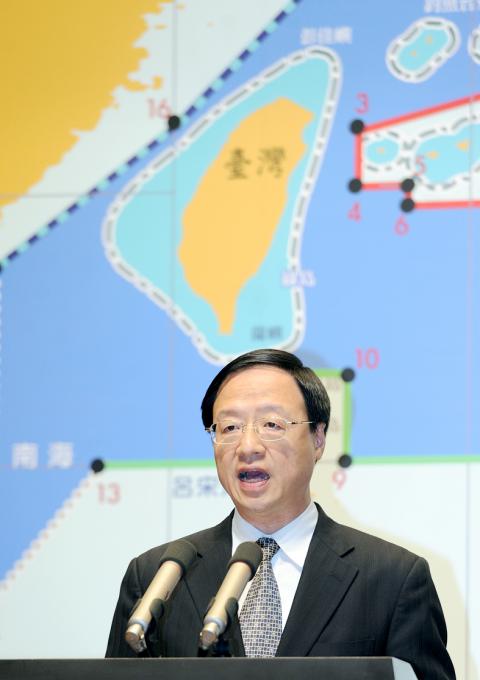The decision by President Ma Ying-jeou’s (馬英九) administration at 10am yesterday morning to punish the Philippines for its failure to meet Taipei’s demands regarding the killing of a fisherman by Philippine Coast Guard personnel came 10 hours later than the government had promised.
After handing out a 72-hour ultimatum for Manila to positively respond to demands on Sunday at 12am, government officials repeatedly vowed to implement three punitive measures against the Philippines if it failed to meet the deadline.
At a press conference at 10am yesterday, following a National Security Council meeting called by Ma at 7am, Premier Jiang Yi-huah (江宜樺) said he was “sorry” that the government did not adhere to the deadline, but denied any change in the government’s stance toward the Philippines’ response.

Photo: Liao Chen-huei, Taipei Times
It was “inappropriate” that the punitive measures against the Philippines were announced after midnight on Tuesday, Jiang said.
Manila’s response, delivered by Manila Economic and Culture Office Managing Director Antonio Basilio to Minister of Foreign Affairs David Lin (林永樂) at 8pm on Tuesday, was subject to revisions after five hours of negotiations.
The response was presented in a letter addressed to Lin by Basilio.
Jiang said the content of the letter was finalized at 11:30pm, after both Lin and Basilio had consulted with government officials.
However, the Ministry of Foreign Affairs staff took extra time to complete the text, both in English and in Chinese, so the meeting continued past the deadline, Jiang said.
The press conference following the negotiations was held at 1am on Wednesday, during which Lin said that Taipei took Manila’s response as “positive,” but that there were some points that “needed to be clarified.”
Lin said at that time that the government would have an inter-agency meeting to examine whether the response met the government’s expectations.
However, Jiang said he knew as soon as the letter was finalized that the response would be “unsatisfactory” to the government.
The Ministry of Foreign Affairs said it had updated both Ma and Jiang in real time during the negotiations with Basilio.
“Because the meeting finished very late, we had no time to have a National Security Council meeting to examine the response,” Jiang said.

A preclearance service to facilitate entry for people traveling to select airports in Japan would be available from Thursday next week to Feb. 25 at Taiwan Taoyuan International Airport, Taoyuan International Airport Corp (TIAC) said on Tuesday. The service was first made available to Taiwanese travelers throughout the winter vacation of 2024 and during the Lunar New Year holiday. In addition to flights to the Japanese cities of Hakodate, Asahikawa, Akita, Sendai, Niigata, Okayama, Takamatsu, Kumamoto and Kagoshima, the service would be available to travelers to Kobe and Oita. The service can be accessed by passengers of 15 flight routes operated by

Chinese spouse and influencer Guan Guan’s (關關) residency permit has been revoked for repeatedly posting pro-China videos that threaten national security, the National Immigration Agency confirmed today. Guan Guan has said many controversial statements in her videos posted to Douyin (抖音), including “the red flag will soon be painted all over Taiwan” and “Taiwan is an inseparable part of China,” and expressing hope for expedited reunification. The agency last year received multiple reports alleging that Guan Guan had advocated for armed reunification. After verifying the reports, the agency last month issued a notice requiring her to appear and explain her actions. Guan

GIVE AND TAKE: Blood demand continues to rise each year, while fewer young donors are available due to the nation’s falling birthrate, a doctor said Blood donors can redeem points earned from donations to obtain limited edition Formosan black bear travel mugs, the Kaohsiung Blood Center said yesterday, as it announced a goal of stocking 20,000 units of blood prior to the Lunar New Year. The last month of the lunar year is National Blood Donation Month, when local centers seek to stockpile blood for use during the Lunar New Year holiday. The blood demand in southern Taiwan — including Tainan and Kaohsiung, as well as Chiayi, Pingtung, Penghu and Taitung counties — is about 2,000 units per day, the center said. The donation campaign aims to boost

The Central Weather Administration (CWA) said a magnitude 4.9 earthquake that struck off the coast of eastern Taiwan yesterday was an independent event and part of a stress-adjustment process. The earthquake occurred at 4:47pm, with its epicenter at sea about 45.4km south of Yilan County Hall at a depth of 5.9km, the CWA said. The quake's intensity, which gauges the actual effects of a temblor, was highest in several townships in Yilan and neighboring Hualien County, where it measured 4 on Taiwan's seven-tier intensity scale, the CWA said. Lin Po-yu (林柏佑), a division chief at the CWA's Seismological Center, told a news conference